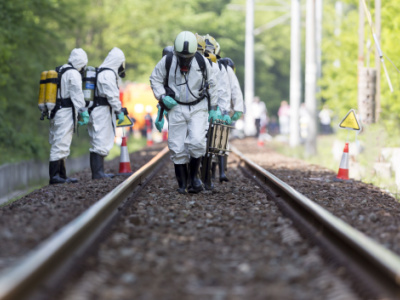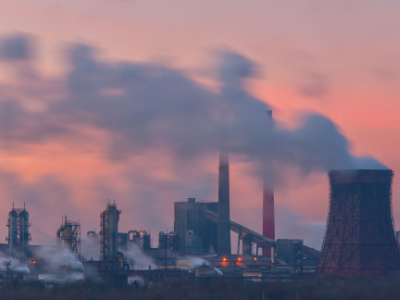Recent Blog Posts
Train Derailments Continue to Cause Toxic Chemical Spills in the U.S.
 On February 3, 2023, a freight train carrying hazardous materials derailed near East Palestine, Ohio. The accident caused a rupture of several tank cars containing dangerous chemicals, resulting in a massive toxic spill. The event quickly turned into an environmental disaster as harmful substances infiltrated water sources and polluted the air residents breathed.
On February 3, 2023, a freight train carrying hazardous materials derailed near East Palestine, Ohio. The accident caused a rupture of several tank cars containing dangerous chemicals, resulting in a massive toxic spill. The event quickly turned into an environmental disaster as harmful substances infiltrated water sources and polluted the air residents breathed.
The immediate effects were felt by people and families living in close proximity to the accident site; they experienced symptoms ranging from nausea and respiratory problems to skin irritations and eye discomfort. Officials chose to perform a controlled burn of several derailed train cars, releasing smoke and chemicals into the atmosphere and potentially affecting people in nearby regions, including areas in southwest Pennsylvania surrounding Pittsburgh.
People who have been exposed to toxic chemicals may suffer a variety of serious health conditions, and they will need to understand what they can do to address these issues. An attorney who has experience representing people affected by toxic chemical exposures can help determine who was responsible for these issues while helping hold companies accountable for accidents and injuries caused by their failures to follow the correct safety procedures.
Monsanto to Pay Verdicts and Settlements for PCB Pollution
 There have been numerous cases in recent years in which large chemical companies have been required to pay compensation to people who have been affected by toxic substances that have been released into the environment. Monsanto is a prominent example, and it has been facing increasing scrutiny and legal action regarding its role in the pollution caused by polychlorinated biphenyls (PCBs). People who have suffered health issues because of these or other chemicals will want to understand their legal options as they seek to hold a company responsible for causing them harm, and they can do so with the help of an experienced attorney.
There have been numerous cases in recent years in which large chemical companies have been required to pay compensation to people who have been affected by toxic substances that have been released into the environment. Monsanto is a prominent example, and it has been facing increasing scrutiny and legal action regarding its role in the pollution caused by polychlorinated biphenyls (PCBs). People who have suffered health issues because of these or other chemicals will want to understand their legal options as they seek to hold a company responsible for causing them harm, and they can do so with the help of an experienced attorney.
Recent PCB-Related Cases Involving Monsanto
In recent months, Monsanto has faced legal action related to PCBs in multiple states. In December of 2023, a jury in Washington ordered Monsanto to pay $857 million to people affected by PCB contamination in light fixtures at a school. Five students and two parent volunteers were affected by the chemicals when water dripped from the fixtures, and many of them became sick. The jury in the case ordered Monsanto to pay $73 million in compensatory damages and $784 million in punitive damages.
Can Particulate Matter in Industrial Pollution Cause Health Risks?
 Industrial pollution is a significant concern in many areas, including Pittsburgh, Allegheny County, and other parts of Pennsylvania. While there are many forms of pollution, particulate matter is among the most dangerous. The release of particulate matter into the air can have detrimental effects on both the environment and human health. People who have been affected by exposure to toxic substances can work with an attorney to determine their options for addressing the harm they and their families have suffered.
Industrial pollution is a significant concern in many areas, including Pittsburgh, Allegheny County, and other parts of Pennsylvania. While there are many forms of pollution, particulate matter is among the most dangerous. The release of particulate matter into the air can have detrimental effects on both the environment and human health. People who have been affected by exposure to toxic substances can work with an attorney to determine their options for addressing the harm they and their families have suffered.
The Dangers of Particulate Matter
Particulate matter refers to tiny particles suspended in the air that are released from various sources, including industrial activities such as manufacturing plants, power plants, and construction sites. These particles can be solid or liquid, and they can vary in size. In general, the most dangerous particles are less than 10 micrometers in diameter.
Can Dangerous Chemicals in Plastics Put Consumers at Risk?
 In today's modern world, plastic has become an integral part of our daily lives. It is used in a wide range of products, from food packaging to electronic devices. However, many plastics contain dangerous chemicals that can potentially put consumers at risk. People who suffer harm due to exposure to toxic substances in consumer products will need to understand their legal options. An experienced attorney can provide guidance on when it may be possible to recover compensation from the makers of dangerous products or other companies that caused them to suffer harm.
In today's modern world, plastic has become an integral part of our daily lives. It is used in a wide range of products, from food packaging to electronic devices. However, many plastics contain dangerous chemicals that can potentially put consumers at risk. People who suffer harm due to exposure to toxic substances in consumer products will need to understand their legal options. An experienced attorney can provide guidance on when it may be possible to recover compensation from the makers of dangerous products or other companies that caused them to suffer harm.
Some chemicals that are commonly found in consumer products include:
Polystyrene
Polystyrene, which is commonly known as styrofoam, is a widely used form of plastic that is known for its good insulation properties. It is commonly found in disposable foam products like cups and food containers. However, polystyrene contains a chemical called styrene which may pose health risks. It can lead to issues such as:
How to Address Wrongful Termination for Reporting Workplace Toxins
 For employees who work in steel mills or other industrial settings, workplace safety is crucial. Employees deserve to address any concerns about workplace safety, including possible harm they may suffer after being exposed to toxic chemicals or other substances. Employees may also report any violations of the law by their employers, such as emissions laws that have been violated by the release of toxic substances into the environment. However, in some cases, employees who blow the whistle on these issues may face wrongful termination. This form of employment discrimination is illegal. Employees who have faced retaliation after engaging in legal activities will need to understand their rights and their legal options. They can do so with the help of an attorney who has experience in these types of cases.
For employees who work in steel mills or other industrial settings, workplace safety is crucial. Employees deserve to address any concerns about workplace safety, including possible harm they may suffer after being exposed to toxic chemicals or other substances. Employees may also report any violations of the law by their employers, such as emissions laws that have been violated by the release of toxic substances into the environment. However, in some cases, employees who blow the whistle on these issues may face wrongful termination. This form of employment discrimination is illegal. Employees who have faced retaliation after engaging in legal activities will need to understand their rights and their legal options. They can do so with the help of an attorney who has experience in these types of cases.
Can “Forever Chemicals” in Drinking Water Cause Health Issues?
 Drinking water is essential for our health and well-being. We rely on it to stay hydrated, nourished, and to support various bodily functions. However, what if the water we consume contains harmful substances that can have long-lasting effects on our health? One such concern is the presence of "forever chemicals" in drinking water. This issue has gained a great deal of attention in recent years, and people who have been exposed to toxic chemicals may be able to seek justice by pursuing compensation from the companies that were responsible. With the help of a qualified and experienced attorney, injury victims can take steps to address the harm they have suffered.
Drinking water is essential for our health and well-being. We rely on it to stay hydrated, nourished, and to support various bodily functions. However, what if the water we consume contains harmful substances that can have long-lasting effects on our health? One such concern is the presence of "forever chemicals" in drinking water. This issue has gained a great deal of attention in recent years, and people who have been exposed to toxic chemicals may be able to seek justice by pursuing compensation from the companies that were responsible. With the help of a qualified and experienced attorney, injury victims can take steps to address the harm they have suffered.
The Dangers of Forever Chemicals
Per- and polyfluoroalkyl substances (PFAS) are a category of chemicals that have been widely used in industrial processes and consumer products since the 1940s. They are resistant to heat, oil, grease, and water, making them useful in a variety of applications such as non-stick cookware, waterproof fabrics, firefighting foams, and food packaging.
What Civilians Can Learn from the Camp Lejeune Tragedy
 Living in a large, industrialized society means putting a great deal of subconscious trust in “the ways things work” each and every day. When you get behind the wheel of a car, you generally assume that those traveling around you will do so safely and that you will reach your destination unharmed. When you shop at your local grocery store, you generally trust that the items you purchase will be relatively safe to eat. And when you turn on the tap, take a shower, or let your kids run through a sprinkler, you generally rely on the idea that the water supply will not make you sick.
Living in a large, industrialized society means putting a great deal of subconscious trust in “the ways things work” each and every day. When you get behind the wheel of a car, you generally assume that those traveling around you will do so safely and that you will reach your destination unharmed. When you shop at your local grocery store, you generally trust that the items you purchase will be relatively safe to eat. And when you turn on the tap, take a shower, or let your kids run through a sprinkler, you generally rely on the idea that the water supply will not make you sick.
Unfortunately, not all businesses and government actors earn the trust that the public subconsciously places in them. And, as a result, it is important to be aware of the risk of certain realities if you or your loved ones start to become ill seemingly out of nowhere. This is a challenge that the victims of the Camp Lejeune tragedy understand all too well.
The Benefits of Toxic Exposure Screening
 In recent years, it has become common knowledge that individuals who worked and/or lived at Camp Lejeune during a specific period of time were exposed to toxic groundwater. As a result of this exposure, many individuals developed severe medical conditions. Although surviving exposure victims now understand that certain medical challenges stem from such exposure, individuals who got sick before this reality was well known may not have made the connection between water on the Base and their illnesses.
In recent years, it has become common knowledge that individuals who worked and/or lived at Camp Lejeune during a specific period of time were exposed to toxic groundwater. As a result of this exposure, many individuals developed severe medical conditions. Although surviving exposure victims now understand that certain medical challenges stem from such exposure, individuals who got sick before this reality was well known may not have made the connection between water on the Base and their illnesses.
This is just a single example of why it can be important for individuals with certain medical conditions to screen for toxic exposure. When someone is diagnosed with cancer, autoimmune challenges, or degenerative conditions, they may understandably assume that they are experiencing an issue that cannot easily be traced to any particular life-related factor. However, toxic exposure screening may reveal that the origin of their challenges can be traced to workplace or environmental toxic exposure that may, ultimately, be legally actionable.
Exposure to Toxic Substances Can Result in Autoimmune Conditions
 When children are small, they learn about the food chain. They come to understand that, for example, when cows eat grass, the materials in the grass fuel a cow’s milk production and/or tissue growth and regeneration. So, even though a child does not eat grass, they do eat the materials in the grass when they drink milk or enjoy a cheeseburger. If the grass has been contaminated, it may affect the cow and the child alike. Such is the nature of toxic exposure. Even if someone does not work directly with toxic substances, their presence in the air, groundwater, dirt, etc. can result in indirect – and potentially harmful – exposure for those who may come into contact with them “down the line.”
When children are small, they learn about the food chain. They come to understand that, for example, when cows eat grass, the materials in the grass fuel a cow’s milk production and/or tissue growth and regeneration. So, even though a child does not eat grass, they do eat the materials in the grass when they drink milk or enjoy a cheeseburger. If the grass has been contaminated, it may affect the cow and the child alike. Such is the nature of toxic exposure. Even if someone does not work directly with toxic substances, their presence in the air, groundwater, dirt, etc. can result in indirect – and potentially harmful – exposure for those who may come into contact with them “down the line.”
Direct or Indirect Toxic Exposure Can Dysregulate the Immune System
When toxic substances are not managed, stored, and disposed of properly, they can affect anyone who comes into contact with them directly or indirectly. Sometimes, even a single exposure can result in medical consequences for an individual. Sometimes, exposure or buildup within the body must occur beyond a specific threshold to do damage.
How Has Lead Contamination in Water Affected Pittsburgh Residents?
 Over the past decade, multiple communities throughout the United States have encountered concerns about lead in drinking water. Flint, Michigan is one of the most prominent examples of this issue, and the crisis faced by residents of that community has led many other cities to examine whether their residents may be affected by toxic substances in the water supply. Pittsburgh is one such city, and in 2016, tests showed that the levels of lead in drinking water were above the limits set by state and federal authorities. Residents of Pittsburgh and Allegheny County may need to determine how they may have been affected by exposure to toxic substances and what options they have for addressing the harm they have suffered.
Over the past decade, multiple communities throughout the United States have encountered concerns about lead in drinking water. Flint, Michigan is one of the most prominent examples of this issue, and the crisis faced by residents of that community has led many other cities to examine whether their residents may be affected by toxic substances in the water supply. Pittsburgh is one such city, and in 2016, tests showed that the levels of lead in drinking water were above the limits set by state and federal authorities. Residents of Pittsburgh and Allegheny County may need to determine how they may have been affected by exposure to toxic substances and what options they have for addressing the harm they have suffered.
Ongoing Efforts to Address Lead in the Pittsburgh Water Supply
The limit for lead in drinking water that has been set by the U.S. Environmental Protection Agency (EPA) is 15 parts per billion. In 2016, tests showed that the water supply in Pittsburgh was 22 parts per billion, and since then, city and county officials have made efforts to reduce these numbers, including replacing lead water lines with copper pipes. More than half of the city's lead pipes have been replaced, and they are all expected to be replaced by 2026. To address ongoing issues related to lead contamination, the Pittsburgh Water & Sewer Authority (PWSA) has added treatments to the water supply that will coat the interior of lead pipes and help prevent water contamination.

 412-680-7877
412-680-7877






